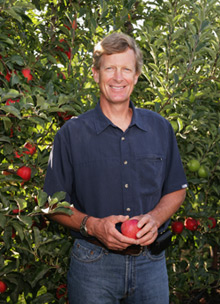Late last year, Seattle Weekly
profiled a small company from British Columbia that is trying to get approval for a genetically modified apple. In December, prospects for the so-called Arctic apple, which does not brown when cut or bruised, were looking good. After three years of deliberations, the U.S. Department of Agriculture had released a favorable assessment and closed its second public comment period. The apple’s producer, Okanagen Specialty Fruits, said it expected a green light within a few months.
That didn’t happen. The family-run company is still awaiting approval. Meanwhile, on Friday, the USDA approved a genetically-modified potato that uses very similar technology. Unlike many genetically modified products, but like the Arctic apple, the “Innate” potato does not introduce organisms from viruses or other plant or animal species. The insertion of such foreign material has given GMOs a bad name in many circles because it is seen as unnatural.
Instead, just like the Arctic apple, the Innate potato uses select genes from potatoes themselves to turn off enzymes responsible for browning. The Innate potato also produces less of a suspected carcinogen, called acrylamide, when fried.
The health benefits of the Innate, and the avoidance of the most controversial techniques in genetic engineering, has failed to assuage GMO critics. Some contend that the method used to turn off genes, called RNA interference, is not sufficiently tested. “We think this is a really premature approval of a technology that is not being adequately regulated Doug Gurian-Sherman, a senior scientist at the Center for Food Safety, told The New York Times.
So why did the Innate get the nod before the Arctic? Reached today by e-mail in South Africa, where he is traveling, Okanagan Specialty Fruits founder Neal Carter did not speculate about that. Instead, he congratulated Innate producer, Boise-based J.R. Simplot Company, on its victory.
Simplot, it should be noted, is a vastly bigger company than Okanagan Specialty Fruits, which has just seven staffers. The Idaho company made a fortune supplying frozen french fries to McDonald’s. Perhaps the feds had more faith in a company of that size, or perhaps Simplot could jump through all of the government’s hoops faster.
It’s probably also true that a genetically-modified apple is a more highly charged prospect than a genetically-modified potato. “It’s a very emotional issue,” Chris Schlect of the Northwest Horticultural Council told me last year. For Americans, the apple is an iconic food, and the idea of messing with it enraged thousands of people who wrote to the USDA urging the department to withhold approval.
The approval of the Innate nevertheless would seem to bode well for the Arctic given the similarities in technique. Carter says that he expects a positive answer from the feds “in the near future.”








